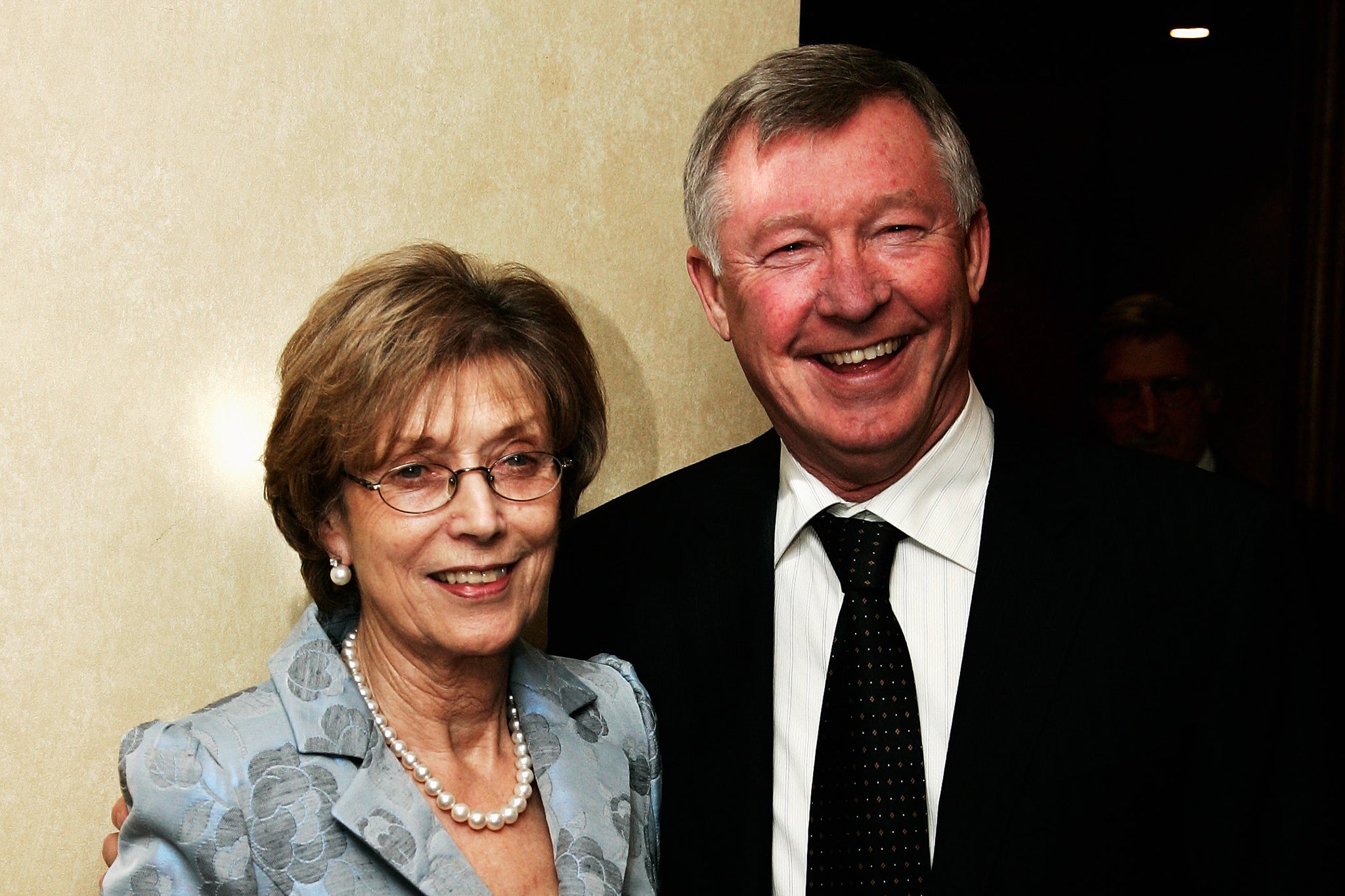‘There is only one person in the world I do not answer back to’
She was his sounding board, adviser and the definer of his moral code, says Jim White. Cathy Ferguson’s death brings to the end a marriage – where she was undisputedly the senior partner – with Sir Alex Ferguson that lasted nearly 60 years


It was way back in 1970 that Cathy Ferguson first influenced the direction of sporting history. Her husband Alex was a bristling, sharp-elbowed, free-scoring centre forward for Falkirk and his renown was growing. Nottingham Forest, at the time comfortably ensconced in the middle of the English First Division, wanted to sign him. And Ferguson fancied the thought of playing south of the border, seeing how the English might cope with his ferocious energy.
His wife, however, was less enamoured by the idea. As her husband was occupied by terrifying rival defences, she was entirely responsible for sorting out domestic matters, like looking after their baby son, Mark. That was their agreement. And she didn’t want to leave Glasgow, where she had an extended family to support her. There was no argument. When Cathy made her reservations known, Ferguson politely turned down Forest and stayed up north. Which meant English football never got to see perhaps the greatest manager of all time plying his trade as a player.
“There is,” Ferguson once said, “only person in the world I do not answer back to.” And he wasn’t referring to any of his club chairmen.
With Cathy Ferguson’s death at the age of 84, we have lost perhaps the most elevated example of quiet, unobtrusive but ultimately critical marital support not just in the sporting arena, but in modern life. Ferguson, back in the mid-Noughties, was arguably the most successful, renowned man in the country, a figure admired across social divides. His influence extended way beyond the football field. Politicians sought his advice, business leaders keenly followed his example.
But what was less recognised was his wife’s influence on him. She was his sounding board, his adviser, the definer of his moral code. Anyone who ever met them together socially would also immediately recognise that this man, recognised across the globe, was at his most comfortable in her presence. Gone would be the brusque, sometimes bullying public persona. With her at his side, he was warm, generous, full of sparkle. And as he held court with anecdote after anecdote, she would gently rib him, rolling her eyes at yet another story she had heard a hundred times before.
They had met when he was a part-time player, obliged to earn a living during the week. They both worked in a typewriter factory. Cathy Holding’s first impression of the noisy young union convenor did not exactly blow her off her feet.
“I just saw him walking through and I thought he was a thug,” she says in the 2021 documentary Sir Alex Ferguson: Never Give In. “Then I found out he was a footballer and that didn’t make him any different to me.” Their first date did little to add to the allure.
“He bought me a box of Liquorice Allsorts at the movies, of which he ate all of them, and a local paper when we came out,” she says on the outing. “That was my romantic day.”

But there was something there, clearly: by 1966 they had married. Glasgow, however, in those days was a city riven with sectarianism. Theirs was a relationship across the divide: Cathy came from a devout Catholic family, Ferguson, while not a regular churchgoer, hailed from Protestant, unionist Govan. As neither wanted the other to be compromised by a church service in one tradition, they married in a registry office. Word got out, however, about the mixed nature of their union. And when Ferguson, by now a full-time professional at Dunfermline, was being courted by Rangers, he was quizzed by a sceptical director who wondered if he had been married in a Catholic church. Ferguson said he hadn’t, it was a registry office. At which the director sighed with relief, suggesting if they had married on Catholic premises, he would not be signed.
“I should have told him to f*** off,” Ferguson says in the documentary. “I really should have. But having supported Rangers as a boy and having the opportunity to go out and play for Rangers, you are prepared to take nonsense. I let myself down there. And I let my wife down – that was the most important thing.”
Cathy immediately forgave him. But then she was way more tolerant than that director, recognising that theirs was a partnership. She gave him the space to pursue his career, first as a player, then as a manager, while she looked after Mark and later their twins, Darren and Jason. Ferguson described her domestic set up as a “military operation”. But clearly, as he advanced through the game with first Aberdeen and then Manchester United to become the most decorated manager in English football history, his home was always his sanctuary. And, after failing to stand by her over the Rangers incident, for the rest of his career, hers was the counsel he always accepted.
It was her, after all, who made him appreciate the gravity of the issue when Eric Cantona assaulted a fan in 1995. Then six years later, she delivered perhaps her most significant piece of advice.
Ferguson had announced his retirement from Old Trafford in December 2001. He was about to turn 62 and fancied spending more time with his wide portfolio of hobbies: racing, collecting wine, American history and musical theatre. Cathy, though, was having none of it. She reckoned him too restless, too consumed by his profession, too preoccupied to give up. On Christmas night she persuaded him to reverse his decision. She didn’t, she told him, want him hanging around under her feet. As a consequence United won six more titles, three more League Cups, one more FA Cup, and perhaps more significantly, their third Champions League trophy. Many a United fan has much to thank her for.

But when in 2013, after 11 further years in control of the club, he decided this really was the time to go, she was not arguing. He stepped down, he said, mainly to help her mourn her sister Bridget, to whom she had been close all her life.
“I think my wife deserves a bit of my time,” he explained of his decision. “The older you get, the more you feel guilty about it. Cathy was the one who talked me out of retiring last time but she wouldn’t do that now.”
The pair stuck steadfastly together in his retirement. Cathy – when she fancied it – was able, after years of being obliged to watch him from afar as he stalked the touchline, to sit alongside him in the stadium at matches. She was there to nurse him through the trauma of brain surgery. They were, to the last, a partnership. And Ferguson, broken by the loss of his companion of the past 57 years, would readily, happily and always acknowledge who was the senior partner.






Join our commenting forum
Join thought-provoking conversations, follow other Independent readers and see their replies
Comments